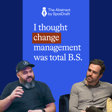
Going Beyond the GC Role: COO Genessa Stout on Organic Growth
“How do I expand my scope of work as a GC or in-house lawyer?”
The in-house legal industry is increasingly seeing GCs step up to the role of COO, CFO, head of people functions, and more. In fact, expanding your role to cross-functional leadership positions has become an important part of growth for senior legal executives.
In episode 9 of The Abstract, we talk to one such leader, who grew her career from a receptionist at a law firm to now the Chief Operating Officer & General Counsel at Tally — Genessa Stout.
We discuss:
— how she grew into this role organically and came to head functions like finance and HR,
— her consumer-centric approach to lawyering,
— how she builds trust and culture within the business and her team, and more.
Read detailed summary: https://www.spotdraft.com/podcast/episode-9
Topics:
Introduction: 00:00
From rural roots to plaintiff-side law at Hagens Berman to CFPB: 01:14
Early days at CFPB: 05:41
Transitioning from CFPB to in-house at PayPal: 08:30
From PayPal to a multidimensional leadership at Tally: 13:42
Fostering trust and heading people and operations functions at Tally: 16:45
Navigating non-legal leadership roles and learning curves in other functions: 19:14
Building culture as a GC and a COO: 23:30
Transitioning from GC to different business leadership roles: 27:07
Advice to young attorneys: 30:45
The evolving role of the GC: 33:04
A book recommendation and insight into what keeps Genessa motivated: 35:00
Connect with us:
Genessa Stout - https://www.linkedin.com/in/genessastout
Tyler Finn - https://www.linkedin.com/in/tylerhfinn
SpotDraft - https://www.linkedin.com/company/spotdraft
SpotDraft is a leading CLM platform that solves your end-to-end contract management issues. Visit https://www.spotdraft.com to learn more.



















